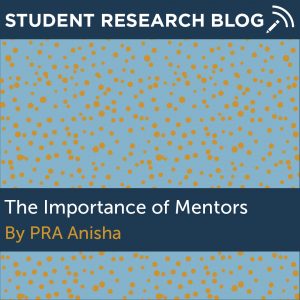By Anisha Jain, OUR Peer Research Ambassador
Why do we need mentors anyway?
Learning can become onerous for anyone and often we feel its weight on our shoulders. Competitiveness in academic culture can become toxic. Having good mentors can help one to navigate the obstacles faced in academic culture. Mentors instill their passions and interests which not only can define our professional lives but impart critical and fundamental experiences in research. I owe a lot to my mentors. The ones who spend hours sitting with me and teaching. The ones who give me opportunities to make my own mistakes. The ones who believed in me even when I didn’t know what I was doing. Mentors give us access to various academic resources, mold us into professionals, and help guide us towards our goals.
Dr. Karin Finberg is a mentor to whom I owe part of every success of mine. She sat with me many times in her office drawing mechanisms of many processes on pieces of paper and explaining each detail to me with great patience. She sent me many papers to read, and I would sit with her for hours drilling her with questions. In return, she not only invested time into teaching me but she became the person who consistently inspires me and supports my goals. She gave me access to many resources including seminars and meeting other experts in her field, and helped me develop skills that allowed me to be an independent thinker.
How do we build these relationships?
With that all said, mentorship isn’t handed to us—it isn’t something we are all entitled to. It’s developed through establishing curiosity, self-advocacy, and (wait for it) hard work.
Sometimes we find something interesting, or we want to learn more about it as an exciting project from afar, but fail to follow through when given the opportunity. What makes the biggest difference is when students express real interest in an area and demonstrate commitment. That is when mentors see it worth their time to invest in a mentee.
When developing relationships with my two most prominent mentors, I recall a lot of reading about topics that I was interested in. I would always ask them also for any papers they thought were relevant and would read them more deeply. When I say read, this doesn’t mean skim through. This means read until every knowledge gap is filled. Whatever I could not understand on my own, my mentors explained that to me. I cannot stress enough that one must be willing to put in the hard work to learn and show commitment. No one expects you to know everything, but showing the desire to learn and work hard is key to get the commitment from your mentor. The more time you invest in, the more likely are the mentors going to invest their time in you.
The process of how we form connections with our mentors is fairly simple, it just requires curiosity and willingness to learn. There is so much gratification in finding these people who share their passions and knowledge as well as develop their students into better and more prepared researchers. If it were not for Karin, I wouldn’t have developed such a deep appreciation for research nor would I have the skillset and connections needed to continue the work. So, I implore all students to invest time in finding your Karin because we all need mentors to guide us in the right direction and support us when we need it most.
Anisha is a senior majoring in Pathobiology and minoring in Molecular & Cell Biology. Click here to learn more about Anisha.